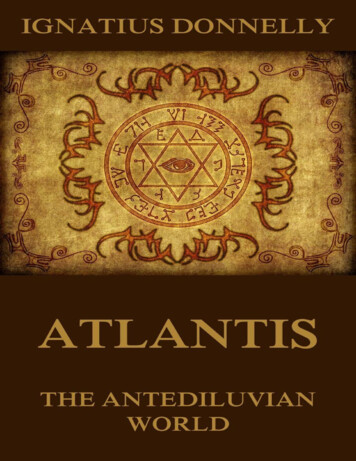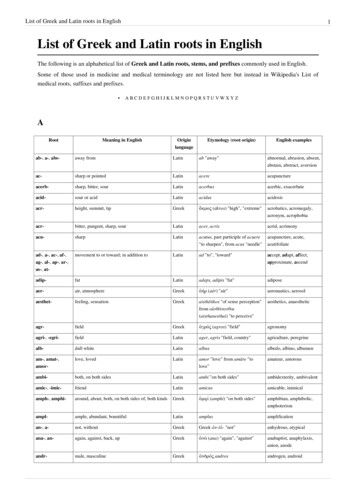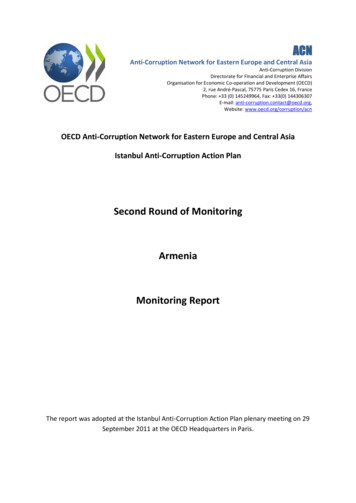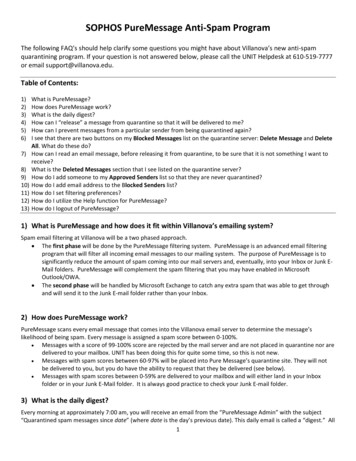
Transcription
Atlantis, The Antediluvian WorldIgnatius Donnelly
Atlantis, The Antediluvian World, I. DonnellyJazzybee Verlag Jürgen Beck86450 Altenmünster, Loschberg 9GermanyISBN: m/jazzybeeverlagadmin@jazzybee-verlag.deCover Design: Derek R. Audette - Fotolia.com
ContentsAtlantis, The Antediluvian WorldPart I. The History Of Atlantis1. The Purpose Of The Book2. Plato's History Of Atlantis3. The Probabilities Of Plato's Story4. Was Such A Catastrophe Possible?5. The Testimony Of The Sea6. The Testimony Of The Flora And FaunaPart II. The Deluge1. The Destruction Of Atlantis Described In The DelugeLegends2. The Deluge Of The Bible3. The Deluge Of The Chaldeans4. The Deluge Legends Of Other Nations5. The Deluge Legends Of America6. Some Consideration Of The Deluge LegendsPart III. The Civilization Of The Old World And NewCompared1. Civilization An Inheritance2. The Identity Of The Civilizations Of The Old World AndThe New3. American Evidences Of Intercourse With Europe OrAtlantis
4. Corroborating Circumstances5. The Question Of Complexion6. Genesis Contains A History Of Atlantis7. The Origin Of Our Alphabet8. The Bronze Age In Europe9. Artificial Deformation Of The SkullPart IV. The Mythologies Of The Old WorldRecollection Of Atlantis1. Traditions Of Atlantis2. The Kings Of Atlantis Become The Gods Of The Greeks3. The Gods Of The Phœnicians Also Kings Of Atlantis4. The God Odin, Woden, Or Wotan5. The Pyramid, The Cross, And The Garden Of Eden6. Gold And Silver The Sacred Metals Of AtlantisPart V. The Colonies Of Atlantis1. The Central American And Mexican Colonies2. The Egyptian Colony3. The Colonies Of The Mississippi Valley4. The Iberian Colonies Of Atlantis5. The Peruvian Colony6. The African Colonies7. The Irish Colonies From Atlantis8. The Oldest Son Of Noah9. The Antiquity Of Some Of Our Great Inventions10. The Aryan Colonies From Atlantis11. Atlantis ReconstructedA
Atlantis, The Antediluvian World
Part IThe History of AtlantisChapter IThe Purpose of the BookThis book is an attempt to demonstrate several distinct andnovel propositions. These are:1. That there once existed in the Atlantic Ocean, oppositethe mouth of the Mediterranean Sea, a large island, whichwas the remnant of an Atlantic continent, and known to theancient world as Atlantis.2. That the description of this island given by Plato is not, ashas been long supposed, fable, but veritable history.3. That Atlantis was the region where man first rose from astate of barbarism to civilization.4. That it became, in the course of ages, a populous andmighty nation, from whose overflowings the shores of theGulf of Mexico, the Mississippi River, the Amazon, the Pacificcoast of South America, the Mediterranean, the west coast ofEurope and Africa, the Baltic, the Black Sea, and the Caspianwere populated by civilized nations.5. That it was the true Antediluvian world; the Garden ofEden; the Gardens of the Hesperides; the Elysian Fields; theGardens of Alcinous; the Mesomphalos; the Olympos; theAsgard of the traditions of the ancient nations; representinga universal memory of a great land, where early mankinddwelt for ages in peace and happiness.6. That the gods and goddesses of the ancient Greeks, thePhœnicians, the Hindoos, and the Scandinavians were
simply the kings, queens, and heroes of Atlantis; and theacts attributed to them in mythology are a confusedrecollection of real historical events.7. That the mythology of Egypt and Peru represented theoriginal religion of Atlantis, which was sun-worship.8. That the oldest colony formed by the Atlanteans wasprobably in Egypt, whose civilization was a reproduction ofthat of the Atlantic island.9. That the implements of the "Bronze Age" of Europe werederived from Atlantis. The Atlanteans were also the firstmanufacturers of iron.10. That the Phœnician alphabet, parent of all the Europeanalphabets, was derived from an Atlantis alphabet, which wasalso conveyed from Atlantis to the Mayas of Central America.11. That Atlantis was the original seat of the Aryan or IndoEuropean family of nations, as well as of the Semiticpeoples, and possibly also of the Turanian races.12. That Atlantis perished in a terrible convulsion of nature,in which the whole island sunk into the ocean, with nearlyall its inhabitants.13. That a few persons escaped in ships and on rafts, and,carried to the nations east and west the tidings of theappalling catastrophe, which has survived to our own time inthe Flood and Deluge legends of the different nations of theold and new worlds.If these propositions can be proved, they will solve manyproblems which now perplex mankind; they will confirm inmany respects the statements in the opening chapters ofGenesis; they will widen the area of human history; they willexplain the remarkable resemblances which exist betweenthe ancient civilizations found upon the opposite shores ofthe Atlantic Ocean, in the old and new worlds; and they willaid us to rehabilitate the fathers of our civilization, ourblood, and our fundamental ideas-the men who lived, loved,
and labored ages before the Aryans descended upon India,or the Phœnician had settled in Syria, or the Goth hadreached the shores of the Baltic.The fact that the story of Atlantis was for thousands of yearsregarded as a fable proves nothing. There is an unbeliefwhich grows out of ignorance, as well as a scepticism whichis born of intelligence. The people nearest to the past arenot always those who are best informed concerning the past.For a thousand years it was believed that the legends of theburied cities of Pompeii and Herculaneum were myths: theywere spoken of as "the fabulous cities." For a thousand yearsthe educated world did not credit the accounts given byHerodotus of the wonders of the ancient civilizations of theNile and of Chaldea. He was called "the father of liars." EvenPlutarch sneered at him. Now, in the language of FrederickSchlegel, "the deeper and more comprehensive theresearches of the moderns have been, the more their regardand esteem for Herodotus has increased." Buckle says, "Hisminute information about Egypt and Asia Minor is admittedby all geographers."There was a time when the expedition sent out by PharaohNecho to circumnavigate Africa was doubted, because theexplorers stated that after they had progressed a certaindistance the sun was north of them; this circumstance,which then aroused suspicion, now proves to us that theEgyptian navigators had really passed the equator, andanticipated by 2100 years Vasquez de Gama in his discoveryof the Cape of Good Hope.If I succeed in demonstrating the truth of the somewhatstartling propositions with which I commenced this chapter,it will only be by bringing to bear upon the question ofAtlantis a thousand converging lines of light from amultitude of researches made by scholars in different fieldsof modern thought. Further investigations and discoveries
will, I trust, confirm the correctness of the conclusions atwhich I have arrived.
Chapter IIPlato's History of AtlantisPlato has preserved for us the history of Atlantis. If our viewsare correct, it is one of the most valuable records which havecome down to us from antiquity.Plato lived 400 years before the birth of Christ. His ancestor,Solon, was the great law-giver of Athens 600 years beforethe Christian era. Solon visited Egypt. Plutarch says, "Solonattempted in verse a large description, or rather fabulousaccount of the Atlantic Island, which he had learned fromthe wise men of Sais, and which particularly concerned theAthenians; but by reason of his age, not want of leisure (asPlato would have it), he was apprehensive the work wouldbe too much for him, and therefore did not go through withit. These verses are a proof that business was not thehinderance:"'I grow in learning as I grow in age.'And again:"'Wine, wit, and beauty still their charms bestow,Light all the shades of life, and cheer us as we go.'"Plato, ambitious to cultivate and adorn the subject of theAtlantic Island, as a delightful spot in some fair fieldunoccupied, to which also he had some claim by reason ofhis being related to Solon, laid out magnificent courts andenclosures, and erected a grand entrance to it, such as noother story, fable, or Poem ever had. But, as he began it late,he ended his life before the work, so that the more thereader is delighted with the part that is written, the moreregret he has to find it unfinished."There can be no question that Solon visited Egypt. Thecauses of his departure from Athens, for a period of ten
years, are fully explained by Plutarch. He dwelt, he tells us,"On the Canopian shore, by Nile's deep mouth."There be conversed upon points of philosophy and historywith the most learned of the Egyptian priests. He was a manof extraordinary force and penetration of mind, as his lawsand his sayings, which have been preserved to us, testify.There is no improbability in the statement that hecommenced in verse a history and description of Atlantis,which he left unfinished at his death; and it requires nogreat stretch of the imagination to believe that thismanuscript reached the hands of his successor anddescendant, Plato; a scholar, thinker, and historian likehimself, and, like himself, one of the profoundest minds ofthe ancient world. The Egyptian priest had said to Solon,"You have no antiquity of history, and no history ofantiquity;" and Solon doubtless realized fully the vastimportance of a record which carried human history back,not only thousands of years before the era of Greekcivilization, but many thousands of years before even theestablishment of the kingdom of Egypt; and he was anxiousto preserve for his half-civilized countrymen this inestimablerecord of the past.We know of no better way to commence a book aboutAtlantis than by giving in full the record preserved by Plato.It is as follows:Critias. Then listen, Socrates, to a strange tale, which is,however, certainly true, as Solon, who was the wisest of theseven sages, declared. He was a relative and great friend ofmy great-grandfather, Dropidas, as he himself says inseveral of his poems; and Dropidas told Critias, mygrandfather, who remembered, and told us, that there wereof old great and marvellous actions of the Athenians, whichhave passed into oblivion through time and the destructionof the human race and one in particular, which was the
greatest of them all, the recital of which will be a suitabletestimony of our gratitude to you.Socrates. Very good; and what is this ancient famous actionof which Critias spoke, not as a mere legend, but as averitable action of the Athenian State, which Solonrecounted!Critias. I will tell an old-world story which I heard from anaged man; for Critias was, as he said, at that time nearlyninety years of age, and I was about ten years of age. Nowthe day was that day of the Apaturia which is called theregistration of youth; at which, according to custom, ourparents gave prizes for recitations, and the poems of severalpoets were recited by us boys, and many of us sung thepoems of Solon, which were new at the time. One of ourtribe, either because this was his real opinion, or because hethought that he would please Critias, said that, in hisjudgment, Solon was not only the wisest of men but thenoblest of poets. The old man, I well remember, brightenedup at this, and said, smiling: "Yes, Amynander, if Solon hadonly, like other poets, made poetry the business of his life,and had completed the tale which he brought with him fromEgypt, and had not been compelled, by reason of thefactions and troubles which he found stirring in this countrywhen he came home, to attend to other matters, in myopinion he would have been as famous as Homer, or Hesiod,or any poet.""And what was that poem about, Critias?" said the personwho addressed him."About the greatest action which the Athenians ever did,and which ought to have been most famous, but which,through the lapse of time and the destruction of the actors,has not come down to us.""Tell us," said the other, "the whole story, and bow and fromwhom Solon heard this veritable tradition."
He replied: "At the head of the Egyptian Delta, where theriver Nile divides, there is a certain district which is calledthe district of Sais, and the great city of the district is alsocalled Sais, and is the city from which Amasis the king wassprung. And the citizens have a deity who is their foundress:she is called in the Egyptian tongue Neith, which is assertedby them to be the same whom the Hellenes called Athene.Now, the citizens of this city are great lovers of theAthenians, and say that they are in some way related tothem. Thither came Solon, who was received by them withgreat honor; and he asked the priests, who were most skilfulin such matters, about antiquity, and made the discoverythat neither he nor any other Hellene knew anything worthmentioning about the times of old. On one occasion, whenhe was drawing them on to speak of antiquity, he began totell about the most ancient things in our part of the world-about Phoroneus, who is called 'the first,' and about Niobe;and, after the Deluge, to tell of the lives of Deucalion andPyrrha; and he traced the genealogy of their descendants,and attempted to reckon bow many years old were theevents of which he was speaking, and to give the dates.Thereupon, one of the priests, who was of very great age;said, 'O Solon, Solon, you Hellenes are but children, andthere is never an old man who is an Hellene.' Solon, bearingthis, said, 'What do you mean?' 'I mean to say,' he replied,'that in mind you are all young; there is no old opinionhanded down among you by ancient tradition, nor anyscience which is hoary with age. And I will tell you thereason of this: there have been, and there will be again,many destructions of mankind arising out of many causes.There is a story which even you have preserved, that onceupon a time Phaëthon, the son of Helios, having yoked thesteeds in his father's chariot, because he was not able todrive them in the path of his father, burnt up all that wasupon the earth, and was himself destroyed by a thunderbolt.Now, this has the form of a myth, but really signifies a
declination of the bodies moving around the earth and inthe heavens, and a great conflagration of things upon theearth recurring at long intervals of time: when this happens,those who live upon the mountains and in dry and loftyplaces are more liable to destruction than those who dwellby rivers or on the sea-shore; and from this calamity theNile, who is our never-failing savior, saves and delivers us.When, on the other hand, the gods purge the earth with adeluge of water, among you herdsmen and shepherds on themountains are the survivors, whereas those of you who livein cities are carried by the rivers into the sea; but in thiscountry neither at that time nor at any other does the watercome from above on the fields, having always a tendency tocome up from below, for which reason the things preservedhere are said to be the oldest. The fact is, that wherever theextremity of winter frost or of summer sun does not prevent,the human race is always increasing at times, and at othertimes diminishing in numbers. And whatever happenedeither in your country or in ours, or in any other region ofwhich we are informed--if any action which is noble or great,or in any other way remarkable has taken place, all that hasbeen written down of old, and is preserved in our temples;whereas you and other nations are just being provided withletters and the other things which States require; and then,at the usual period, the stream from heaven descends like apestilence, and leaves only those of you who are destitute ofletters and education; and thus you have to begin all overagain as children, and know nothing of what happened inancient times, either among us or among yourselves. As forthose genealogies of yours which you have recounted to us,Solon, they are no better than the tales of children; for, inthe first place, you remember one deluge only, whereasthere were many of them; and, in the next place, you do notknow that there dwelt in your land the fairest and noblestrace of men which ever lived, of whom you and your wholecity are but a seed or remnant. And this was unknown to
you, because for many generations the survivors of thatdestruction died and made no sign. For there was a time,Solon, before that great deluge of all, when the city whichnow is Athens was first in war, and was preeminent for theexcellence of her laws, and is said to have performed thenoblest deeds, and to have had the fairest constitution ofany of which tradition tells, under the face of heaven.' Solonmarvelled at this, and earnestly requested the priest toinform him exactly and in order about these former citizens.'You are welcome to hear about them, Solon,' said the priest,'both for your own sake and for that of the city; and, aboveall, for the sake of the goddess who is the common patronand protector and educator of both our cities. She foundedyour city a thousand years before ours, receiving from theEarth and Hephæstus the seed of your race, and then shefounded ours, the constitution of which is set down in oursacred registers as 8000 years old. As touching the citizensof 9000 years ago, I will briefly inform you of their laws andof the noblest of their actions; and the exact particulars ofthe whole we will hereafter go through at our leisure, in thesacred registers themselves. If you compare these very lawswith your own, you will find that many of ours are thecounterpart of yours, as they were in the olden time. In thefirst place, there is the caste of priests, which is separatedfrom all the others; next there are the artificers, whoexercise their several crafts by themselves, and withoutadmixture of any other; and also there is the class ofshepherds and that of hunters, as well as that ofhusbandmen; and you will observe, too, that the warriors inEgypt are separated from all the other classes, and arecommanded by the law only to engage in war; moreover, theweapons with which they are equipped are shields andspears, and this the goddess taught first among you, andthen in Asiatic countries, and we among the Asiatics firstadopted.
"'Then, as to wisdom, do you observe what care the law tookfrom the very first, searching out and comprehending thewhole order of things down to prophecy and medicine (thelatter with a view to health); and out of these divineelements drawing what was needful for human life, andadding every sort of knowledge which was connected withthem. All this order and arrangement the goddess firstimparted to you when establishing your city; and she chosethe spot of earth in which you were born, because she sawthat the happy temperament of the seasons in that landwould produce the wisest of men. Wherefore the goddess,who was a lover both of war and of wisdom, selected, andfirst of all settled that spot which was the most likely toproduce men likest herself. And there you dwelt, havingsuch laws as these and still better ones, and excelled allmankind in all virtue, as became the children and disciplesof the gods. Many great and wonderful deeds are recorded ofyour State in our histories; but one of them exceeds all therest in greatness and valor; for these histories tell of amighty power which was aggressing wantonly against thewhole of Europe and Asia, and to which your city put an end.This power came forth out of the Atlantic Ocean, for in thosedays the Atlantic was navigable; and there was an islandsituated in front of the straits which you call the Columns ofHeracles: the island was larger than Libya and Asia puttogether, and was the way to other islands, and from theislands you might pass through the whole of the oppositecontinent which surrounded the true ocean; for this seawhich is within the Straits of Heracles is only a harbor,having a narrow entrance, but that other is a real sea, andthe surrounding land may be most truly called a continent.Now, in the island of Atlantis there was a great andwonderful empire, which had rule over the whole island andseveral others, as well as over parts of the continent; and,besides these, they subjected the parts of Libya within theColumns of Heracles as far as Egypt, and of Europe as far as
Tyrrhenia. The vast power thus gathered into one,endeavored to subdue at one blow our country and yours,and the whole of the land which was within the straits; andthen, Solon, your country shone forth, in the excellence ofher virtue and strength, among all mankind; for she was thefirst in courage and military skill, and was the leader of theHellenes. And when the rest fell off from her, beingcompelled to stand alone, after having undergone the veryextremity of danger, she defeated and triumphed over theinvaders, and preserved from slavery those who were not yetsubjected, and freely liberated all the others who dweltwithin the limits of Heracles. But afterward there occurredviolent earthquakes and floods, and in a single day andnight of rain all your warlike men in a body sunk into theearth, and the island of Atlantis in like manner disappeared,and was sunk beneath the sea. And that is the reason whythe sea in those parts is impassable and impenetrable,because there is such a quantity of shallow mud in the way;and this was caused by the subsidence of the island.'("Plato's Dialogues," ii., 617, Timæus.) . . ."But in addition to the gods whom you have mentioned, Iwould specially invoke Mnemosyne; for all the importantpart of what I have to tell is dependent on her favor, and if Ican recollect and recite enough of what was said by thepriests, and brought hither by Solon, I doubt not that I shallsatisfy the requirements of this theatre. To that task, then, Iwill at once address myself."Let me begin by observing, first of all, that nine thousandwas the sum of years which had elapsed since the war whichwas said to have taken place between all those who dweltoutside the Pillars of Heracles and those who dwelt withinthem: this war I am now to describe. Of the combatants onthe one side the city of Athens was reported to have beenthe ruler, and to have directed the contest; the combatantson the other side were led by the kings of the islands of
Atlantis, which, as I was saying, once had an extent greaterthan that of Libya and Asia; and, when afterward sunk by anearthquake, became an impassable barrier of mud tovoyagers sailing from hence to the ocean. The progress ofthe history will unfold the various tribes of barbarians andHellenes which then existed, as they successively appear onthe scene; but I must begin by describing, first of all, theAthenians as they were in that day, and their enemies whofought with them; and I shall have to tell of the power andform of government of both of them. Let us give theprecedence to Athens. . . ."Many great deluges have taken place during the ninethousand years, for that is the number of years which haveelapsed since the time of which I am speaking; and in all theages and changes of things there has never been anysettlement of the earth flowing down from the mountains, asin other places, which is worth speaking of; it has alwaysbeen carried round in a circle, and disappeared in thedepths below. The consequence is that, in comparison ofwhat then was, there are remaining in small islets only thebones of the wasted body, as they may be called, all thericher and softer parts of the soil having fallen away, and themere skeleton of the country being left. . . ."And next, if I have not forgotten what I heard when I was achild, I will impart to you the character and origin of theiradversaries; for friends should not keep their stories tothemselves, but have them in common. Yet, beforeproceeding farther in the narrative, I ought to warn you thatyou must not be surprised if you should bear Hellenic namesgiven to foreigners. I will tell you the reason of this: Solon,who was intending to use the tale for his poem, made aninvestigation into the meaning of the names, and found thatthe early Egyptians, in writing them down, had translatedthem into their own language, and he recovered themeaning of the several names and retranslated them, and
copied them out again in our language. My greatgrandfather, Dropidas, had the original writing, which is stillin my possession, and was carefully studied by me when Iwas a child. Therefore, if you bear names such as are used inthis country, you must not be surprised, for I have told youthe reason of them."The tale, which was of great length, began as follows: Ihave before remarked, in speaking of the allotments of thegods, that they distributed the whole earth into portionsdiffering in extent, and made themselves temples andsacrifices. And Poseidon, receiving for his lot the island ofAtlantis, begat children by a mortal woman, and settledthem in a part of the island which I will proceed to describe.On the side toward the sea, and in the centre of the wholeisland, there was a plain which is said to have been thefairest of all plains, and very fertile. Near the plain again,and also in the centre of the island, at a distance of aboutfifty stadia, there was a mountain, not very high on any side.In this mountain there dwelt one of the earth-born primevalmen of that country, whose name was Evenor, and he had awife named Leucippe, and they had an only daughter, whowas named Cleito. The maiden was growing up towomanhood when her father and mother died; Poseidon fellin love with her, and had intercourse with her; and, breakingthe ground, enclosed the hill in which she dwelt all round,making alternate zones of sea and land, larger and smaller,encircling one another; there were two of land and three ofwater, which he turned as with a lathe out of the centre ofthe island, equidistant every way, so that no man could getto the island, for ships and voyages were not yet heard of.He himself, as he was a god, found no difficulty in makingspecial arrangements for the centre island, bringing twostreams of water under the earth, which he caused to ascendas springs, one of warm water and the other of cold, andmaking every variety of food to spring up abundantly in the
earth. He also begat and brought up five pairs of malechildren, dividing the island of Atlantis into ten portions: hegave to the first-born of the eldest pair his mother's dwellingand the surrounding allotment, which was the largest andbest, and made him king over the rest; the others he madeprinces, and gave them rule over many men and a largeterritory. And he named them all: the eldest, who was king,he named Atlas, and from him the whole island and theocean received the name of Atlantic. To his twin-brother,who was born after him, and obtained as his lot theextremity of the island toward the Pillars of Heracles, as faras the country which is still called the region of Gades inthat part of the world, he gave the name which in theHellenic language is Eumelus, in the language of thecountry which is named after him, Gadeirus. Of the secondpair of twins, he called one Ampheres and the otherEvæmon. To the third pair of twins he gave the nameMneseus to the elder, and Autochthon to the one whofollowed him. Of the fourth pair of twins he called the elderElasippus and the younger Mestor. And of the fifth pair hegave to the elder the name of Azaes, and to the youngerDiaprepes. All these and their descendants were theinhabitants and rulers of divers islands in the open sea; andalso, as has been already said, they held sway in the otherdirection over the country within the Pillars as far as Egyptand Tyrrhenia. Now Atlas had a numerous and honorablefamily, and his eldest branch always retained the kingdom,which the eldest son handed on to his eldest for manygenerations; and they had such an amount of wealth as wasnever before possessed by kings and potentates, and is notlikely ever to be again, and they were furnished witheverything which they could have, both in city and country.For, because of the greatness of their empire, many thingswere brought to them from foreign countries, and the islanditself provided much of what was required by them for theuses of life. In the first place, they dug out of the earth
whatever was to be found there, mineral as well as metal,and that which is now only a name, and was then somethingmore than a name--orichalcum--was dug out of the earth inmany parts of the island, and, with the exception of gold,was esteemed the most precious of metals among the menof those days. There was an abundance of wood forcarpenters' work, and sufficient maintenance for tame andwild animals. Moreover, there were a great number ofelephants in the island, and there was provision for animalsof every kind, both for those which live in lakes and marshesand rivers, and also for those which live in mountains and onplains, and therefore for the animal which is the largest andmost voracious of them. Also, whatever fragrant things thereare in the earth, whether roots, or herbage, or woods, ordistilling drops of flowers or fruits, grew and thrived in thatland; and again, the cultivated fruit of the earth, both thedry edible fruit and other species of food, which we call bythe general name of legumes, and the fruits having a hardrind, affording drinks, and meats, and ointments, and goodstore of chestnuts and the like, which may be used to playwith, and are fruits which spoil with keeping--and thepleasant kinds of dessert which console us after dinner,when we are full and tired of eating--all these that sacredisland lying beneath the sun brought forth fair andwondrous in infinite abundance. All these things theyreceived from the earth, and they employed themselves inconstructing their temples, and palaces, and harbors, anddocks; and they arranged the whole country in the followingmanner: First of all they bridged over the zones of sea whichsurrounded the ancient
1. Traditions Of Atlantis 2. The Kings Of Atlantis Become The Gods Of The Greeks 3. The Gods Of The Phœnicians Also Kings Of Atlantis 4. The God Odin, Woden, Or Wotan 5. The Pyramid, The Cross, And The Garden Of Eden 6. Gold And Silver The Sacred Metals Of Atlantis Pa r t V.











